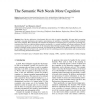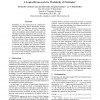146 search results - page 10 / 30 » Synthetic Environment Representational Semantics Using the W... |
165
Voted
SEMWEB
2010
Springer
14 years 8 months ago
2010
Springer
One of the key deficiencies of the Semantic Web is its lack of cognitive plausibility. We argue that by accounting for people's reasoning mechanisms and cognitive representati...
104
click to vote
IJCAI
2007
15 years 3 months ago
2007
Modularity is a key requirement for collaborative ontology engineering and for distributed ontology reuse on the Web. Modern ontology languages, such as OWL, are logic-based, and ...
107
Voted
ELPUB
2006
ACM
15 years 7 months ago
2006
ACM
Among the new possibilities that the Semantic Web has enabled, the authoring task is considered as a key moment for semantic representation of knowledge to enhance publishing need...
154
Voted
DKE
2008
15 years 1 months ago
2008
Logic is currently the target of the majority of the upcoming efforts towards the realization of the Semantic Web vision, namely making the content of the Web accessible not only t...
119
Voted
ESWS
2007
Springer
15 years 8 months ago
2007
Springer
WSML is an ontology language specifically tailored to annotate Web Services, and part of its semantics adheres to the rule-based knowledge representation paradigm of logic program...


